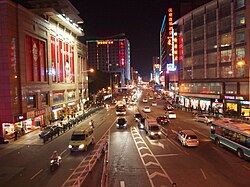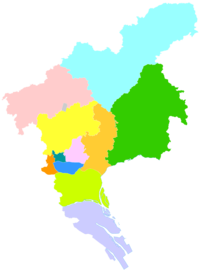Panyu District
|
Panyu 番禺区 |
|
|---|---|
| District | |

Shiqiao Subdistrict
|
|
 Panyu in Guangzhou
|
|
| Coordinates: 22°56′11″N 113°23′03″E / 22.93639°N 113.38417°ECoordinates: 22°56′11″N 113°23′03″E / 22.93639°N 113.38417°E | |
| Country | People's Republic of China |
| Province | Guangdong |
| Sub-provincial city | Guangzhou |
| Area | |
| • Total | 786.15 km2 (303.53 sq mi) |
| Population (2010 census) | |
| • Total | 1,764,869 |
| • Density | 2,245/km2 (5,810/sq mi) |
| Time zone | China Standard (UTC+8) |
| Postal code | 511400 |
| Area code(s) | 020 |
| Website | www |
| Panyu District | |||||||||||||||
| Chinese | |||||||||||||||
|---|---|---|---|---|---|---|---|---|---|---|---|---|---|---|---|
| Canton Romanization | Pun1-yu4 | ||||||||||||||
| Hanyu Pinyin | Pānyú | ||||||||||||||
| Postal | Punyu | ||||||||||||||
|
|||||||||||||||
| Transcriptions | |
|---|---|
| Standard Mandarin | |
| Hanyu Pinyin | Pānyú |
| Yue: Cantonese | |
| Yale Romanization | Pūnyùh |
| Jyutping | Pun1-jyu4 |
| Canton Romanization | Pun1-yu4 |
Panyu, formerly romanized as Punyu, is a district of Guangzhou, the capital of Guangdong province in southern China. It is the site of the oldest parts of Guangzhou, dating back to the Qin Empire, although it was a separate county-level city before its incorporation into modern Guangzhou. The present district covers an area of about 661.88 square kilometres (255.55 sq mi).
Panyu lies at the heart of the Pearl River Delta, its boundary straddles from latitudes 22.26' to 23.05', and sprawls from longitudes 113.14' to 113.42'. Facing the Lion Sea in the east and the estuary of the Pearl River in the south, its eastern border is separated from the Dongguan by a strip of water, and the western border of Panyu is adjacent to the cities of Nanhai, Shunde and Zhongshan, while it abuts the downtown of Guangzhou in the north. The site of the People's government of Panyu is Shiqiao which is 17 kilometres (11 mi) from downtown Guangzhou and 38 and 42 nautical miles (70 and 78 km) from the cities of Hong Kong and Macao respectively.
The Chinese settlement at Panyu was established by the Qin armies under Zhao Tuo during their first failed invasion of the Baiyue in Guangdong in 214 BC. There are at least 11 separate theories on the etymology of the name. Upon the fall of the Qin, Zhao Tuo established Panyu as the capital of his kingdom of Nanyue in 204 BC. Archaeological evidence shows that it was a burgeoning commercial center: among the present material object remnants, there are those of Southeast Asian, Indian, and even African origin.
...
Wikipedia
